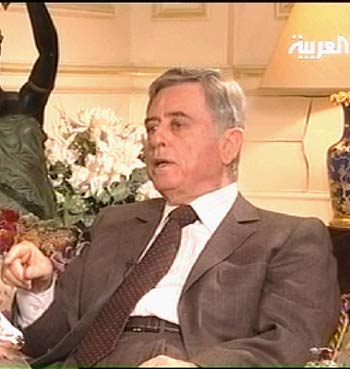
Former Syrian vice-president Abdel Halim Khaddam speaks during an exclusive interview with the Dubai-based Al-Arabiyya channel (AFP)
A while back, the BBC hosted four young Arabs in one of its English programs. Among the youths was a young Saudi named Nawaf Obaid and this particular episode focused on whether oil has been a curse or a blessing for the Gulf. When the western media refers to the Gulf, it usually means Saudi Arabia in particular.
The debate became heated and the program’s presenter asked difficult and penetrating questions that the Saudi guest, Obaid, managed to refute most of the time in fluent English. Strong criticism and the argument that oil has been a curse was not only given by the presenter but also from a young Arab woman who challenged Nawaf. The young woman’s criticism was all too familiar as it represented the Arab perception of Gulf societies, a perception that has given birth to terms such as “The Oil Culture.” However, what many do not realize is that such a “culture,” which perhaps was dominant once upon a time, is now obsolete, with a different cultural reality in Gulf societies and in Saudi Arabia. This new reality has manifested itself and continues to do so, in a range of fields. Concerning Saudi Arabia in particular, it is now contributing to fields in which other Arabs used to dominate.
Mr. Obaid rejected the argument that oil is a curse for the Middle East giving examples in which oil revenues have financed development, construction and the eradicating of widespread illiteracy. The young Arab women, however, responded by pointing out that Saudi Arabia ranks only 77th in terms of quality of education worldwide. As the audience applauded her response, to which Mr. Obaid replied, “Without oil, we would have ranked 177th!”
Nawaf was wise in his words. He remained calm the whole time, and rational in his answers demonstrating intelligence more than emotion. His intelligence was further portrayed in his criticism of the kingdom as he did not refer only to the positive aspects, but also recognized and admitted the kingdom’s faults. Mr. Obaid stated that the this state does not seek to conceal negative aspects and provides the example of the fifth National Debate Forum.
There seems to be a common bewilderment, albeit with different intentions and content, between western and Saudi media. The latter attempts to transmit only the optimistic and ignores the pessimistic. It seeks to shut out any opportunity for any foreign news agencies to interpret any Saudi events that may tarnish the kingdom’s image internationally. Some articles in the local Saudi press play the role of beautifying rather than seeking to develop society.
As for the western media, it seeks to portray anything established by a Saudi man or woman as a phenomenon. For example, if an American journalist meets a Saudi woman who is wearing a pair jeans, or a Saudi man who drives erratically, then these would be presented as remarkable incidents!
It seems, therefore, that as young Saudis, we are doomed to remain under the spotlight, and this it would seem is a project for western media. We are not a society of angels and we never will be. King Abdullah Bin Abdulaziz has stated in an interview for American media that the reform process has already started in more than one field. It is painful to see the western media’s attempts to marginalize these noticeable changes.
Surely, we are not at cultural war with the West, despite some attempts to depict this image. This is evident from over 34,000 applications to the Ministry of Higher Education for scholarships to study in the United States.
All that is required from the Western media is more objectivity and a break from stereotypical views of Saudi society. These stereotypes at the best of times reduce Saudi Arabia to a tent, a camel and an oil well, while at its worst, a home for terrorism.
